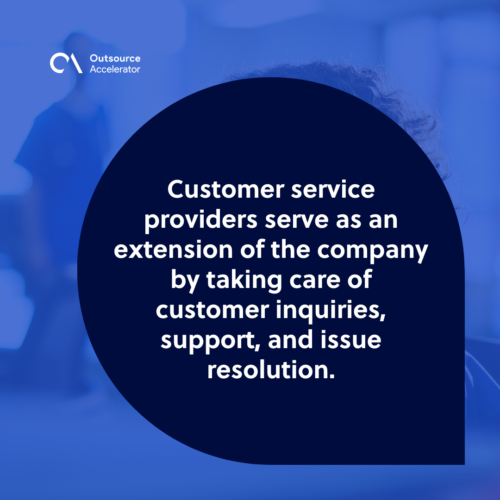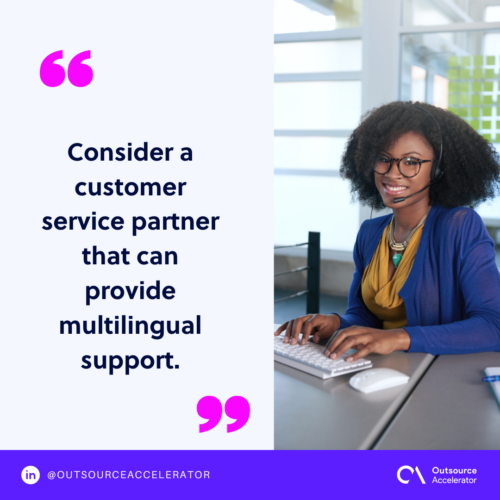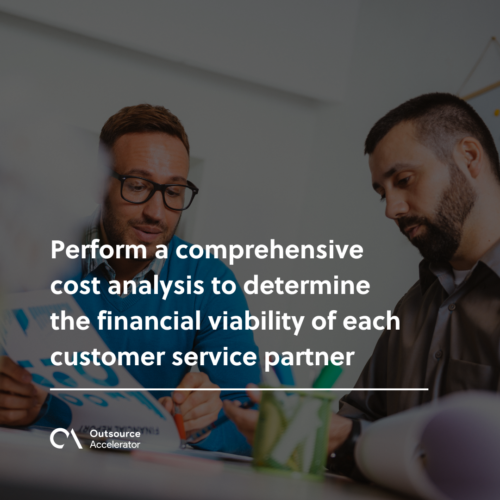Choosing the right customer service partner for your business

There’s no doubt customer service is vital in today’s competitive business landscape. It is the frontline that directly interacts with customers — representing the brand and influencing their overall experience.
With the rise of outsourcing, many businesses are partnering with customer service providers. These partners allow them to guarantee excellence in their support efforts.
According to Apollo Technical, customer service is one of the largest outsourced tasks. This global industry was valued at almost US $82 billion before 2023.
Choosing the right customer service partner is crucial, especially for enterprises looking to outsource their customer support operations.
In this article, we will explore the benefits of having a customer service partner and the factors to consider when choosing one. We will also provide a step-by-step guide to help you find the right customer service partner for your business.
What is a customer service partner?
A customer service partner works alongside businesses to manage and enhance their customer service operations.
Customer service providers like 123Employee serve as an extension of the company by taking care of customer inquiries, support, and issue resolution. They act as the bridge between the enterprise and its customers, ensuring smooth communication and delivering exceptional customer experiences.

Advantages of a customer service partner
Teaming up with a customer service partner brings the following key advantages:
Flexible and scalable operations
As businesses grow, their customer service demands may increase as well. A customer service partner offers scalability.
These expert providers allow organizations to handle a higher volume of inquiries without compromising the quality of service. They have the infrastructure and resources to adapt to changing customer needs, ensuring uninterrupted support during peak seasons or periods of growth.
A reliable customer service partner can quickly adapt to meet these demands even if they’re tasked with:
- Handling seasonal fluctuations
- Expanding into new markets
- Launching new products
Save on cost and resources
Establishing an in-house customer service department can be costly. You would need to invest in recruitment, training, technology, and infrastructure.
Partnering with a customer service provider eliminates the need for such investments. Because they handle the costs associated with recruiting, training, and managing customer service agents.
This results in significant cost savings and allows you to allocate resources efficiently. The company can also focus more on core operations.
Expertise and specialization
With a customer service partner, you gain access to professionals that handle customer inquiries and resolve issues effectively.
These experts undergo rigorous training to ensure they have the necessary skills and knowledge to deliver exceptional customer service.
They have extensive industry knowledge and expertise and know the best practices. By leveraging their experience, you can benefit from optimized processes and strategies that drive customer satisfaction and loyalty.
Multilingual support
In today’s interconnected world, businesses often cater to clients from various regions and linguistic backgrounds.
A customer service partner with multilingual capabilities can provide support in multiple languages. This ensures effective communication with diverse customer bases.
24/7 availability
Customer issues can arise anytime, and enterprises need to be responsive. A customer service partner can provide round-the-clock support across different time zones.
This ensures that client queries and complaints are addressed promptly. In turn, it will boost customer satisfaction and loyalty.
Advanced technologies and integrations
Customer service partners leverage advanced technologies and tools to enhance their support operations.
They utilize customer relationship management (CRM) systems, ticketing software, live chat platforms, and other cutting-edge solutions. These tools allow them to:
- Streamline customer interactions
- Improve response times
- Gather valuable customer data for analysis
These technological integrations enable organizations to deliver efficient and personalized customer service experiences.
Data and analytics
Customer service partners gather and analyze data to gain insights into customer behavior, preferences, and pain points.
They provide businesses with valuable analytics, enabling data-driven decision-making. This helps you refine your strategies, optimize processes, and identify areas for improvement.
Reduced compliance risks
Compliance with data protection laws and industry regulations is very important. A customer service partner with a strong focus on compliance can ensure adherence to regulatory requirements.
This reduces the risk of legal issues and data breaches — protecting both the company and its customers.
Factors to consider when choosing a customer service partner
Selecting the right customer service partner is crucial for maximizing the benefits mentioned. Here’s what to consider during the selection process:
Industry or niche expertise
Look for a provider with experience in the same sector or line of work. They will have a better understanding of your customers’ needs, specific challenges, and industry regulations. This knowledge can contribute to more effective customer support outcomes.
Languages and geographical coverage
Consider a customer service partner that can provide multilingual support. Especially if your business operates in many countries or serves clients from diverse language backgrounds.
It’s good to check their geographical coverage and availability in different time zones. This can ensure seamless customer support operations.
Technology capabilities and integrations
Evaluate a customer service partner’s technology infrastructure. This includes examining their CRM systems, ticketing software, and communication channels.
Make sure there’s compatibility and seamless integration with your existing systems. This facilitates effective collaboration and data sharing.
Service level agreements (SLAs) and pricing models
Clearly define service level agreements (SLAs), including expected response times, resolution timelines, and quality metrics.
Understand the partner’s pricing models and ensure they align with your budget and expected return on investment (ROI).
Client reviews and success stories
Research the customer service partner’s reputation and track record. Find client reviews and testimonials to gauge their service quality, reliability, and customer satisfaction levels.
Look for case studies or success stories that demonstrate their ability to deliver results.

9 steps for finding the right customer service partner
Here’s a simple step-by-step guide you can follow in choosing the best customer service partner for your business:
1. Understanding your business needs
Begin by assessing your business’s unique requirements and goals. Consider factors such as:
- Volume of customer inquiries
- Expected growth
- Target markets
- Specific industry demands
You can then identify the specific challenges you want the customer service partner to address. By understanding your needs, you can find a provider who aligns with your needs by understanding your needs.
2. Researching potential customer service partners
Conduct extensive research to find potential customer service partners that cater to your industry or niche.
You can use online directories, industry forums, and recommendations from trusted sources. These help you create a shortlist of suitable candidates.
Pay attention to partners who have experience working with enterprises similar to yours.
3. Evaluating service quality
Evaluate the service quality provided by each potential customer service partner. Look for indications of professionalism, responsiveness, and attention to detail.
Assess their communication channels, response times, and the availability of different support options. Nowadays, it’s vital to cover all bases through phone, email, live chat, and social media.
In addition, you can request case studies or testimonials to gauge their ability to deliver high-quality customer service.
4. Technology and tools
Assess the technology and tools employed by each customer service partner. You need to consider whether their systems integrate with your existing infrastructure.
Or you can check if they offer advanced solutions that align with your business requirements.
Look for features such as CRM integration, analytics capabilities, and automation tools that can enhance your customer support processes.
5. Communication and collaboration
A successful partnership relies on effective communication and collaboration. That’s why evaluating how well potential partners communicate and align with your company’s culture and values is important.
Determine their willingness to work closely with your core teams. Check their ability to adapt to your preferred communication channels and collaboration tools.
6. Cost analysis and return on investment (ROI)
Perform a comprehensive cost analysis to determine the financial viability of each customer service partner. Compare pricing models, contract terms, and any additional fees associated with the partnership.
Furthermore, consider the potential return on investment. Take into account the provider’s ability to:
- Improve customer satisfaction
- Increase retention rates
- Generate positive word-of-mouth referrals

7. Contract negotiation and service level agreement (SLA)
Once you’ve found a viable customer service partner, it’s time to negotiate. Make sure the agreement aligns with your business needs and expectations.
Pay close attention to the SLA terms. Review the expected response times, issue resolution protocols, and performance guarantees. You may seek legal counsel if necessary to protect your interests and ensure a fair agreement.
8. Onboarding and transition process
The onboarding and transition process should be smooth and well-defined. This can be achieved by discussing the implementation timeline, data migration, and training requirements.
You should also talk through any necessary integration with your existing systems. Clear communication and planning during this phase are essential to minimize disruptions and secure a successful partnership.
9. Continuous evaluation and improvement
After choosing a customer service partner, maintain an ongoing evaluation process. It’s important to assess their performance and identify areas for improvement.
Regularly review customer feedback, metrics, and key performance indicators (KPIs) to gauge the effectiveness of the partnership. Collaborate with your provider to address concerns and optimize customer service operations consistently.
Remember, selecting the right customer service partner is a strategic decision. It requires thorough evaluation and consideration.
By taking into account the factors mentioned and following the step-by-step guide provided, you can find the right provider for your organization.
A reliable customer service partner can help you build long-lasting customer relationships, improve satisfaction, and drive business growth.







 Independent
Independent




